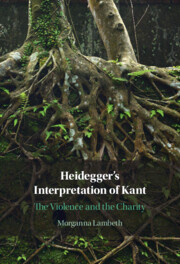
-
Select format
-
- Publisher:
- Cambridge University Press
- Publication date:
- June 2023
- June 2023
- ISBN:
- 9781009239271
- 9781009239257
- 9781009239233
- Dimensions:
- (229 x 152 mm)
- Weight & Pages:
- 0.49kg, 230 Pages
- Dimensions:
- (229 x 152 mm)
- Weight & Pages:
- 0.339kg, 230 Pages
You may already have access via personal or institutional login
Book description
Heidegger has a reputation for reading himself into the philosophers he interprets, and his interpretation of Kant has therefore had little uptake in anglophone Kant scholarship. In this book, Morganna Lambeth provides a new account of Heidegger's method of interpreting Kant, arguing that it is more promising than is typically recognized. On her account, Heidegger thinks that Kant's greatest insights are located in moments of tension, where Kant struggles to articulate something new about his subject-matter. The role of the interpreter, then, is to disentangle competing strands of argument, and to determine which strand is most compelling. Lambeth traces Heidegger's interpretive method across his reading of Kant's Critique of Pure Reason and situates Heidegger's reconstruction of Kant's best line of argument against other post-Kantian readings. She finally shows how Heidegger's deep engagement with Kant sheds light on Heidegger's own philosophical views.
Reviews
‘With exemplary clarity and command, Morganna Lambeth's reconstructive interpretation of Heidegger's early studies of Kant makes a persuasive case for underappreciated lines of real convergence between the two thinkers (not least on the subject of time). By showing how Heidegger elaborates the most promising of inconsistent strands of Kant's argument, she demonstrates the depths of Heidegger's self-acknowledged philosophical indebtedness to Kant.'
Daniel O. Dahlstrom - Boston University
Contents
Metrics
Altmetric attention score
Full text views
Full text views help Loading metrics...
Loading metrics...
* Views captured on Cambridge Core between #date#. This data will be updated every 24 hours.
Usage data cannot currently be displayed.
Accessibility standard: Unknown
Why this information is here
This section outlines the accessibility features of this content - including support for screen readers, full keyboard navigation and high-contrast display options. This may not be relevant for you.
Accessibility Information
Accessibility compliance for the PDF of this book is currently unknown and may be updated in the future.


